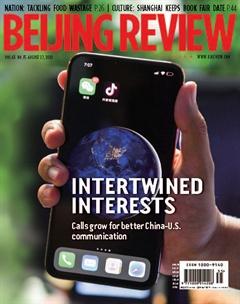Unlikely to Decouple
Whether by restricting business or peopleto-people exchanges, it would appear as though the Trump administration is deliberately directing China-U.S. relations down a path towards decoupling. However, a decoupling of the United States and China is not only completely improbable, but would also offer no benefi t to either party, nor benefit the rest of the international community.
Since the formal establishment of diplomatic ties on January 1, 1979, China and the United States have built a close relationship. Such a deep bond is irreversible, regardless of how it is viewed by the Trump administration. Take the China-U. S. exchanges during the epidemic period this year as an example. Although the fl ow of people between the two countries has been interrupted, the flow of goods is increasing. According to a recent survey by the American Chamber of Commerce in China (AmCham China), 84 percent of U.S. fi rms are unwilling to leave China. So far this year, U.S. fi rms such as ExxonMobil, Honeywell, Tesla and Walmart have expanded their investment in and cooperation with China.
Analysis from AmCham China further indicates that the Trump administrations increased tariffs on Chinese products have resulted in Americans paying an extra $50 billion, or an average of $1,277 per family, in 2019 alone. Due to the disputes between China and the United States during the past months, the market value of U.S. listed companies has been reduced by $1.7 trillion, which hints at the disastrous consequences of a total decoupling of these two countries. U.S. businesses do not want the two sides to decouple, nor does the mainstream public in the United States. U.S. should not undermine China-U.S. relations for their own selfi sh interests.
In working toward a decoupling, some U.S. politicians are in complete denial of the history of China-U.S. relations. This history, based on the wisdom, hard work and cooperation of several generations of leaders of both countries, and administrations on both sides, will never be easily negated.
China and the United States are two countries with two different systems. This is a fact that has existed since the establishment of bilateral diplomatic ties. The Shanghai Communique, signed between them in 1972, confirmed from the outset that the two countries have essential differences in their social systems, but this has not affected the establishment and development of relations. Today, such differences should not become obstacles to furthering cooperation in the future.
In the context of the global pandemic, China and the United States should not impose any limits on bilateral exchange, let alone instigate a decoupling. Instead, they should be providing more assistance to the international community to address the current crisis, and fulfill their responsibilities as major powers.

